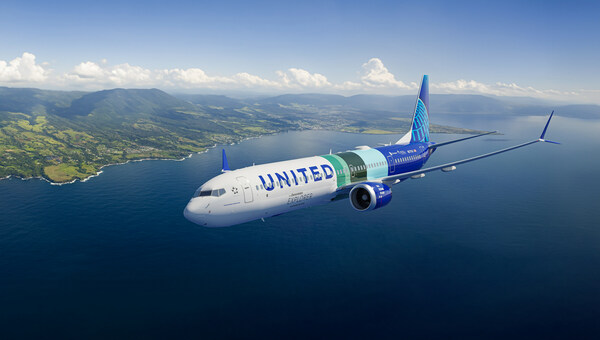Advancing Sustainable Aviation
In an inspiring collaboration to boost sustainability in the aviation industry, Boeing has teamed up with NASA and United Airlines. Together, they aim to conduct in-flight testing to assess how sustainable aviation fuel (SAF) influences contrails, non-carbon emissions, and the overall climate impact throughout the fuel’s life cycle.
ecoDemonstrator with DC-8
Boeing’s ecoDemonstrator Explorer, a 737-10 aircraft designated for United Airlines, will play a pivotal role in this environmental research. During the testing phase, the aircraft will carry both 100% SAF and traditional jet fuel in separate tanks, allowing researchers to compare the performance of these fuels. Flying in close pursuit, NASA’s DC-8 Airborne Science Lab will measure emissions produced by each type of fuel and record data on contrail ice particles. Simultaneously, NASA satellites will capture crucial images of contrail formation as part of this comprehensive analysis.
Addressing Climate Impact
This collaborative effort aims to deepen our understanding of how innovative fuels, engine combustor designs, and other advanced technologies can contribute to reduced atmospheric warming. Notably, the study will focus on how SAF affects the characteristics of contrails, which are the condensation trails formed as airplanes traverse cold, humid air. Although the full impact of contrails remains a subject of ongoing research, it is believed that certain types of contrails may contribute to heat retention in the atmosphere.
Crucial SAF Supplier
World Energy, located in Paramount, California, will be supplying the SAF used in the tests. In addition to Boeing, NASA, and United Airlines, other key contributors and supporters include:
- The U.S. Federal Aviation Administration (FAA) through the ASCENT Center of Excellence
- GE Aerospace, offering technical expertise and financial support
- The German Aerospace Center (Deutsches Zentrum für Luft- und Raumfahrt or DLR), providing experts and instrumentation
A Continuing Partnership
This project marks the latest phase in a long-standing collaboration between Boeing and NASA. Their objective is to investigate how SAF can reduce emissions and offer environmental benefits. In comparison to conventional jet fuel, SAF, derived from sustainable feedstocks, can lower emissions by up to 85% across its life cycle. Additionally, SAF produces less soot, which contributes to improved air quality in the vicinity of airports.
Comments from the Test Partners
- Boeing Chief Sustainability Officer Chris Raymond emphasized the significance of this research for expanding our understanding of SAF’s impact beyond carbon emissions. He expressed confidence in achieving a more sustainable future for aerospace through dedicated efforts.
- NASA’s Mission Integration Manager for the Sustainable Flight National Partnership, Rich Wahls, highlighted the importance of flight testing in comprehending the changes brought about by sustainable aerospace innovations. He underlined the value of the NASA DC-8 aircraft in gathering essential flight data.
- United Airlines Chief Sustainability Officer Lauren Riley recognized the collaboration’s potential to provide insights into the broader benefits of transitioning to SAF beyond greenhouse-gas reductions.
- GE Aerospace Vice President of Engineering Mohamed Ali expressed pride in supporting this pioneering research, which will enhance our scientific knowledge of SAF’s impact on emissions and contribute to a more sustainable future in aviation.
- Markus Fischer, DLR Divisional Board Member for Aeronautics, emphasized the need for international cooperation in achieving climate-compatible aviation. DLR’s commitment to researching the climate impact of aviation underscores the global determination to reduce both CO2 and non-CO2 effects in the aviation industry.
Continuing the ecoDemonstrator Program
This year, Boeing expanded its ecoDemonstrator program to include Explorer aircraft, focusing on short-term, specific test projects. The collaboration between Boeing and NASA has been marked by significant milestones, including SAF emissions ground testing on an Alaska Airlines 737-9 in 2021, as well as flight tests on ecoDemonstrator 777-200ER and 787-10 aircraft in 2022. Boeing is committed to delivering commercial airplanes compatible with 100% SAF by 2030.
Fueled by #SustainableAviationFuel and ready to fly! ⛽🛫
— The Boeing Company (@Boeing) October 12, 2023
Our second ecoDemonstrator Explorer, a 737-10 destined for @United, will participate in flight tests with @NASAAero, @FAANews, @GE_Aerospace and @DLR_en to study #SAF’s impact on contrails.
More: https://t.co/CuhwkrZEz4 pic.twitter.com/jC9L7dXyeb
A Glimpse of the Future
The 737-10 aircraft chosen for this research is the largest member of Boeing’s single-aisle 737 MAX family. Notably, this family of aircraft reduces fuel consumption and emissions by an impressive 20% compared to the airplanes it replaces. This endeavor underscores the aviation industry’s commitment to a more sustainable and eco-friendly future.
Photo: Boeing, NASA
For more info, please visit https://boeing.mediaroom.com/2023-10-12-Boeing,-NASA,-United-Airlines-To-Test-SAF-Benefits-with-Air-to-Air-Flights

